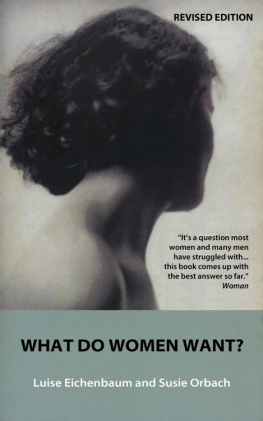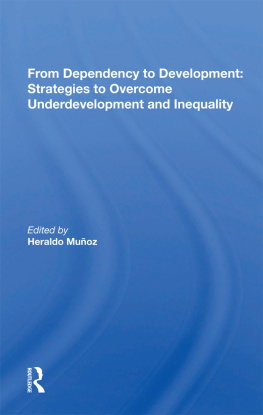Luise Eichenbaum - WHAT DO WOMEN WANT?: Exploding the Myth of Dependency
Here you can read online Luise Eichenbaum - WHAT DO WOMEN WANT?: Exploding the Myth of Dependency full text of the book (entire story) in english for free. Download pdf and epub, get meaning, cover and reviews about this ebook. year: 2014, genre: Home and family. Description of the work, (preface) as well as reviews are available. Best literature library LitArk.com created for fans of good reading and offers a wide selection of genres:
Romance novel
Science fiction
Adventure
Detective
Science
History
Home and family
Prose
Art
Politics
Computer
Non-fiction
Religion
Business
Children
Humor
Choose a favorite category and find really read worthwhile books. Enjoy immersion in the world of imagination, feel the emotions of the characters or learn something new for yourself, make an fascinating discovery.
- Book:WHAT DO WOMEN WANT?: Exploding the Myth of Dependency
- Author:
- Genre:
- Year:2014
- Rating:4 / 5
- Favourites:Add to favourites
- Your mark:
- 80
- 1
- 2
- 3
- 4
- 5
WHAT DO WOMEN WANT?: Exploding the Myth of Dependency: summary, description and annotation
We offer to read an annotation, description, summary or preface (depends on what the author of the book "WHAT DO WOMEN WANT?: Exploding the Myth of Dependency" wrote himself). If you haven't found the necessary information about the book — write in the comments, we will try to find it.
WHAT DO WOMEN WANT?: Exploding the Myth of Dependency — read online for free the complete book (whole text) full work
Below is the text of the book, divided by pages. System saving the place of the last page read, allows you to conveniently read the book "WHAT DO WOMEN WANT?: Exploding the Myth of Dependency" online for free, without having to search again every time where you left off. Put a bookmark, and you can go to the page where you finished reading at any time.
Font size:
Interval:
Bookmark:
Luise Eichenbaum & Susie Orbach
Copyright 1983, 1999, 2014 Luise Eichenbaum and Susie Orbach
Susie Orbach and Luise Eichenbaum have asserted their rights in accordance with the Copyright, Designs and Patents Act 1988 to be identified as the author of this work.
All rights reserved under International and Pan-American Copyright Conventions. No part of this text may be reproduced, transmitted, stored in or introduced into any information storage and retrieval system, in any form or by any means, whether electronic or mechanical, now known or hereinafter invented, without the express written permission of the Publisher.
I t is possible to answer the question What do women want? Yet it is a question that has bewildered people for decades. Sigmund Freud, father of psychoanalysis, made the question a famous one when he declared it as "the great question that has never been answered and which I have not yet been able to answer, despite my thirty years of research into the feminine soul." Freud was referring to women of the Victorian era, but the confusion, bewilderment, and frustration that so often accompany that question have continued to the present day. Nearly a century later, men certainly continue to be baffled, and even women themselves continue to be perplexed when faced with the question What do you want?
In our thirty-five years as psychotherapists we have had the opportunity to reflect on this question with hundreds of women and men in great detail. In our earliest years of practice when we opened The Women's Therapy Centre in London, the confusion and self-recrimination that surrounded women's wants and desires were strikingly evident. And now, in 2012, in each of our practices in London and New York, the content of women's stories may have changed, reflecting the social changes in women's lives over the past quarter of a century, but the confusion and disgust about women's needs lives on. Young women today speak with shame of the ways they feel dependent on their partner (if they have one), or shame about their desire for a reliable relationship (if they don't have one). It's not supposed to be that way anymore. They feel a social pressure to be independent, confident, and able to take care of their own needs. They believe that it was different for their grandmothers, and even mothers, who were raised with different expectations about who they could and should be and were brought up to place themselves in marriages where their dependency was assumed. Relationships seem so much more complicated these days. And yet we know full well of the struggle of those grandmothers and mothers to find identities for themselves within the confines of a circumscribed social role. Moreover, as we shall show, emotional dependency was, in fact, as complicated for women of those generations as it is for younger women today. For although our grandmothers may have appeared to be dependent (and may have been economically), most felt terribly isolated emotionally. Where emotional dependency existed, they were the providers of that care, not, by and large, the recipients. There was a vast imbalance in the reciprocity of emotional care.
We have had groups at The Women's Therapy Centre Institute of women in their twenties meeting with women in their sixties easily understanding, identifying, and sharing similar feelings about vulnerability and need in intimate relationships. They are speaking the same language. The feelings cross generational lines so that there is a striking continuity in experience, a common denominator of emotional hunger, and confusion about their entitlement to feed that hunger.
In our psychotherapy practices both women and men of diverse backgrounds and ages talk about problems in relationships. Connecting with another person is rarely trouble free. People express confusion about how much they can expect from a partner, a friend, a parent, a colleague, or a child. Discord, anger, and frustration are often part and parcel of engaging with other people. When Jane goes out with Zack for the first time and likes him, she awaits the phone call that will reassure her that he too enjoyed himself. By Wednesday of the following week, having not heard from him, she's angry and ready to walk away from the relationship. Why doesn't he realize that the right thing to do is to call? She hates feeling what she's feeling. She hates feeling vulnerable. Confusion becomes a part of the picture as she examines the details of the situation and asks herself whether her expectations are reasonable, whether she has the right to expect him to call, whether she deserves more thoughtful attention. Anger returns as she reminds herself that she's being badly treated. She won't think about texting or calling him because that would expose her even further. And yet as she waits she feels powerless, invisible, neglected. And so Jane goes back and forth in her own mind, in battle, about the legitimacy of her needs and expectations. Is she wrong? Are all of these dreadful feelings her own fault for wanting something in the first place? This scenario can happen after just one date or it can happen after twenty years of marriage when a partner disappoints. Over the last ten years on-line dating sites have their own version of this familiar dance. At the heart of many of these painful situations is the dis-ease which so often accompanies needing something from another person, wanting an emotional connection.
In our culture the need to connect and get emotional support from another person has gotten a bum rap. Rather than appreciate the beauty of the human capacity for emotional engagementthat is, the ability to think about what we feel, to reflect on what has occurred in our daily lives and relationships, to put these feelings into words and to communicate them to another personall too often we feel shame and fear at the prospect of exposing our deepest emotions to others.
Dependency does not have to be a dirty word. A different understanding of dependency allows for a host of constructive changes in all of our relationships. The painful cycle of frustration, dissatisfaction, and self-blame is not inevitable. Since the first printing of this book so much has changed in the lives of women and men in relation to sexuality, family life, parenting, and work. Gender remains a determinant in all of these aspects of life, but the balance has shifted slightly, making way for new patterns that then affect all of us psychologically. This is a fascinating time in the history of gender relations because we all live with the deeply internalized legacy of past generations as we simultaneously live in a very changed world. That begins to explain the confusion that accompanies feelings of dependency. In the following pages we offer a way to understand that legacy, its psychological consequences for women and men, and, we hope, an optimistic view of a direction for change.
Luise Eichenbaum
New York
Susie Orbach
London
2012
Missed Connections

D espite thirty years of feminist influence, men's and women's daily life experience, their inner and outer worlds, and their socialization continue to be very different. It often feels as though women live in one emotional world and men in another, in which different feelings, different languages, different moral codes, and different ways of expressing personal desires and ambitions exist. As Carol Gilligan demonstrated in her research on adolescents, girls and boys, women and men, hear In a Different Voice
Font size:
Interval:
Bookmark:
Similar books «WHAT DO WOMEN WANT?: Exploding the Myth of Dependency»
Look at similar books to WHAT DO WOMEN WANT?: Exploding the Myth of Dependency. We have selected literature similar in name and meaning in the hope of providing readers with more options to find new, interesting, not yet read works.
Discussion, reviews of the book WHAT DO WOMEN WANT?: Exploding the Myth of Dependency and just readers' own opinions. Leave your comments, write what you think about the work, its meaning or the main characters. Specify what exactly you liked and what you didn't like, and why you think so.







